

Who Does the Ethicist Think He Is? Is it ethical for a student to submit the same paper in two college classes?
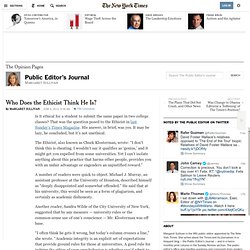
That was the question posed to the Ethicist in last Sunday’s Times Magazine. His answer, in brief, was yes. It may be lazy, he concluded, but it’s not unethical. The Ethicist, also known as Chuck Klosterman, wrote: “I don’t think this is cheating. I wouldn’t say it qualifies as ‘genius,’ and it might get you expelled from some universities.
A number of readers were quick to object. Another reader, Sandra Wilde of the City University of New York, suggested that by any measure — university rules or the common-sense use of one’s conscience — Mr. Journal of Practical Ethics. Introducing the Journal of Practical Ethics Roger Crisp & Julian Savulescu Journal of Practical Ethics 1(1): 1-2 The Journal of Practical Ethics is a new open access, interdisciplinary journal in applied moral philosophy and related areas of philosophy, including political and legal philosophy.
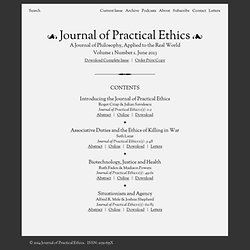
It is supported by the Uehiro Foundation on Ethics and Education and we are most grateful to the Foundation for making the journal possible. Expositions: Interdisciplinary Studies in the Humanities, ethics issue. Common Sense Computing Initiative. Knotty Fun at the Joint Math Meetings. Mathematicians attempting to untangle a human knot at a knot "flash mob" on January 11, 2013 at the Joint Mathematics Meetings.
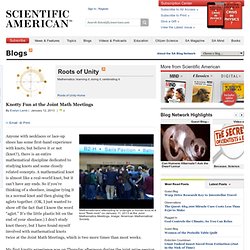
Image: American Mathematical Society Anyone with necklaces or lace-up shoes has some first-hand experience with knots, but believe it or not (knot?) , there is an entire mathematical discipline dedicated to studying knots and some closely related concepts. Sokal affair. The resultant academic and public quarrels concerned the scholarly merit of humanistic commentary about the physical sciences; the influence of postmodern philosophy on social disciplines in general; academic ethics, including whether Sokal was wrong to deceive the editors and readers of Social Text; and whether the journal had exercised appropriate intellectual rigor before publishing the pseudoscientific article. Background[edit] In an interview on the NPR program All Things Considered, Sokal said he was inspired to submit the hoax article after reading Higher Superstition (1994), by Paul R.
How We Know by Freeman Dyson. The Information: A History, a Theory, a Flood by James Gleick Pantheon, 526 pp., $29.95.
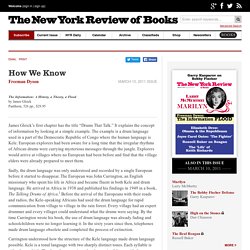
Knowledge How. First published Tue Dec 4, 2012 It is common in epistemology to distinguish among three kinds of knowledge.
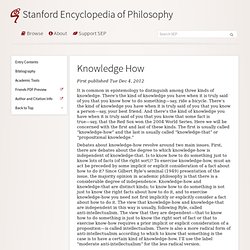
There's the kind of knowledge you have when it is truly said of you that you know how to do something—say, ride a bicycle. There's the kind of knowledge you have when it is truly said of you that you know a person—say, your best friend. And there's the kind of knowledge you have when it is truly said of you that you know that some fact is true—say, that the Red Sox won the 2004 World Series. Here we will be concerned with the first and last of these kinds. Debates about knowledge-how revolve around two main issues. Daniel Ellsberg on the Limits of Knowledge. "Henry, there's something I would like to tell you, for what it's worth, something I wish I had been told years ago.
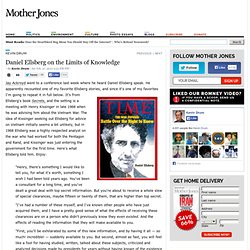
You've been a consultant for a long time, and you've dealt a great deal with top secret information. Jean-Jacques Rousseau, Birthday Boy - Brainstorm. Happy birthday, you wild child!
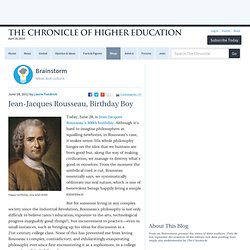
Today, June 28, is Jean-Jacques Rousseau’s 300th birthday. Although it’s hard to imagine philosophers as squalling newborns, in Rousseau’s case, it makes sense. There Is Such a Thing as Truth « Errol Morris. How Science Changes - Rebecca J. Rosen. An interview with Samuel Arbesman, author of The Half-Life of Facts Dim Dimich/Shutterstock/Rebecca J. Rosen In 1947 a mathematician named Derek J. de Solla Price came to Raffles College in Singapore to teach. Imitation of Life. Can a computer program reproduce everything that happens inside a living cell? Brian Hayes Almost 30 years ago, Harold J.
Morowitz, who was then at Yale, set forth a bold plan for molecular biology. He outlined a campaign to study one of the smallest single-celled organisms, a bacterium of the genus Mycoplasma. The first step would be to decipher its complete genetic sequence, which in turn would reveal the amino acid sequences of all the proteins in the cell. Teaching complete evolutionary stories increases learning. Public release date: 15-Jun-2013 [ Print | E-mail Share ] [ Close Window ] Contact: Tim Beardsleytbeardsley@aibs.org 703-674-2500 x326American Institute of Biological Sciences.
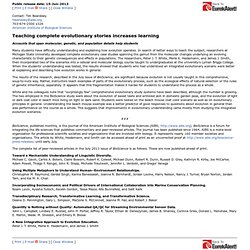
Half the Facts You Know Are Probably Wrong. Dinosaurs were cold-blooded.
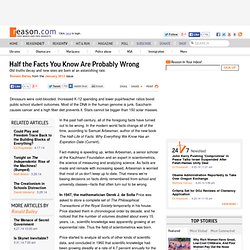
Increased K-12 spending and lower pupil/teacher ratios boost public school student outcomes. Most of the DNA in the human genome is junk. Saccharin causes cancer and a high fiber diet prevents it. Stars cannot be bigger than 150 solar masses. Arens: GER 389K.1: Fundamentals of Scholarship. Description: This course is designed for beginning graduate students, to introduce the various branches of literary, linguistic, and cultural studies today, in the context of the national literatures and for comparative literature.
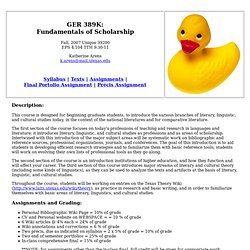
The first section of the course focuses on today's professions of teaching and research in languages and literature; it introduces literary, linguistic, and cultural studies as professions and as areas of scholarship. Intertwined with this introduction of the major subject areas will be systematic work on bibliographic and reference sources, professional organizations, journals, and conferences. The goal of this introduction is to aid students in developing efficient research strategies and to familiarize them with basic reference tools; students will work on evolving their own lists of professional tools as they go along. The second section of the course is an introduction institutions of higher education, and how they function and will affect your career.
Arens: CL382: Kristeva and Žižek Read Lacan. 1968 Course - Fall 2008. It’s a Smart, Smart, Smart World. Human Intelligence: The Flynn Effect. This page is now located at an updated address. Please update your bookmarks! The new address is posted below. You will be redirected to the new page in 15 seconds or you can click the link below. Books: None of the Above. Correction appended. One Saturday in November of 1984, James Flynn, a social scientist at the University of Otago, in New Zealand, received a large package in the mail. It was from a colleague in Utrecht, and it contained the results of I.Q. tests given to two generations of Dutch eighteen-year-olds.
When Flynn looked through the data, he found something puzzling. The Dutch eighteen-year-olds from the nineteen-eighties scored better than those who took the same tests in the nineteen-fifties—and not just slightly better, much better. Curious, Flynn sent out some letters. Race, IQ, and Wealth. 7.2 Metaphors of the Mind. Where Memes Really Come From. The Word Tree, an Interactive Visual Concordance. Lessness: Randomness, Consciousness and Meaning.
Rectification of names. The Philosophy of Data. A Non-Euclidean View of California as a Cold Place to Be (Ursula K. Le Guin. Opinion: Open access aids science research - Rep. Jim Sensenbrenner. No one likes paying for the same thing twice. This holds true for federally funded scientific research. A Brief History of Open Data. Pragmatism, Idealism and DeepDyve’s Five Minutes in Heaven. If it is possible, I consider myself to be both an idealist and a pragmatist with regard to scholarly publishing. On the idealist side, I view scientific publishing as a natural extension of the necessity of sharing scientific results with others. Gödel, Escher, Bach. Time Regained! by James Gleick. Physics: What We Do and Don’t Know by Steven Weinberg. In the past fifty years two large branches of physical science have each made a historic transition. Let’s Shake Up the Social Sciences.
Defensive political science responds defensively to an attack on social science. Nick Brown Smelled Bull by Vinnie Rotondaro Narratively. The Magic Ratio That Wasn't - Percolator. The Essayification of Everything. The legitimacy and usefulness of academic blogging will shape how intellectualism develops. The Question About Man. Information, Knowledge & Intelligence. 18 Complicated Scientific Ideas Explained Simply. Ten Hundred Words of Science. "Cargo Cult Science" - by Richard Feynman. 29 answers to the question 'What is a human being?' What is Science and Why Should We Care? Logos. A Brief History of Anti-Intellectualism in American Media. The state of our union is … dumber: How the linguistic standard of the presidential address has declined.
The Edinburgh Companion to the History of Democracy. The Computer Delusion by Todd Oppenheimer. How Computerized Tutors Are Learning to Teach Humans. Technology Affordances. Teaching Me Softly - Issue 6: Secret Codes.